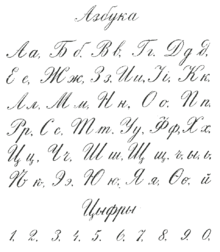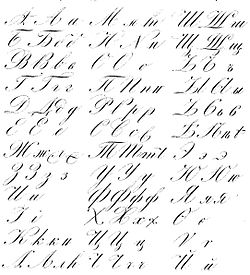- Russian cursive
-
Russian cursive is the handwritten form of the modern Russian language, used instead of the block letters seen in printed material. In addition, Russian italics for the lowercase letters are often based on Russian cursive (such as lowercase Т, which looks like Latin m). Most handwritten Russian, especially personal letters and schoolwork, uses the cursive alphabet because it is much faster to write than block letters if learned correctly. In Russian schools, most children are taught by first grade how to write using this script.
Contents
History
The cursive form first appeared late-Middle Ages, succeeding the current ustav or "block letter" writing.[1]
Features
Russian cursive is often more ambiguous than English cursive. Several letters look markedly different from their block counterparts and a few letters look similar to one another. To alleviate some of the ambiguity, a horizontal bar is sometimes written above the character if it is «т» or below if it is «ш». However, those fluent in Russian often omit the bar. Additionally, several letters are preceded by a small "hook" to help readers further distinguish between confusing letters. These letters are «л», «м», and «я». The "hook" is written regardless of where the letter occurs in a given word. Unlike English cursive, however, the Russian cursive system is not considered a "formal" style of writing. It is standard practice for Russians to write in cursive almost exclusively.
Although it might seem complex at first, the Russian cursive system is easily learned by foreign language students with memorization and practice. Indeed, many introductory Russian language courses spend only a session or two teaching the cursive system. Mastery is gained naturally while further learning the language.
See also
- Cursive
- Macedonian cursive
- Cursive Hebrew
- Roman cursive
- Russian alphabet
References
- ^ Ziegler. "Short history of the Russian language". Lomonosov University. http://www.studyrussian.com/MGU/general_about_Russian_language.html. Retrieved 2007-04-04.
Types of handwritten European scripts Ancient
and MedievalRoman • Rustic • Uncial • Visigothic • Merovingian • Carolingian • Insular script • Beneventan • Blackletter • Rotunda • Bastarda • Humanist • Greek • Cyrillic • Glagolitic • Gothic
Modern 
This article related to the Cyrillic alphabet is a stub. You can help Wikipedia by expanding it.




